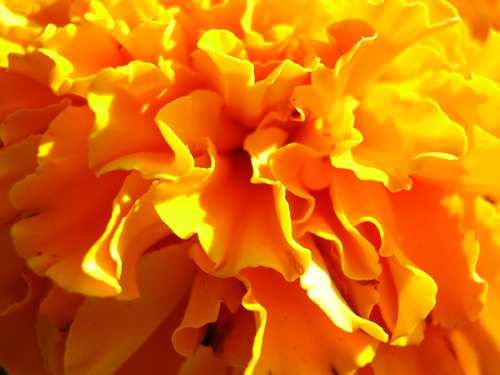Description
Botanical: Calendula officinalis
Other common names: Marigold, Calandula, Garden Calendula, Garden Calandula, Holigold, Golds,
Pot Marigold, Mary Bud, Mary Gowles, Bride of the Sun, Butterwort
Calendula soothes! Its anti-inflammatory and antiseptic qualities have been used for centuries to ease skin infections, ulcerations, bowel problems, hemorrhoids, diaper rash and varicose veins. The herb is also said to reduce fever and treat indigestion, as well as help gallbladder and liver problems. Calendula is also considered a topical anti-inflammatory and widely used in cosmetics for its toning and soothing effects.
Country of Origin: Indonesia
Beneficial Uses:
Calendula has a long history as a superior antibacterial herb when used internally and externally and has been used to heal many skin irritations, wounds, bee stings and injuries, including eczema, herpes, gingivitis, varicose veins and athlete's foot. It is thought to be similar to Witch Hazel, due to its natural iodine content, and may be used as a local application to heal all types of skin problems. Calendula reduces inflammation and is soothing to the skin and some consider this herb to be the best tissue healer for wounds. Old herbal doctors believed that constant applications of Calendula as a topical antiseptic would help or even prevent gangrene or tetanus.
As a diaphoretic and febrifuge, Calendula is often used to induce perspiration and break a fever.
Calendula is a powerful anti-inflammatory and painkilling agent that is thought to reduce inflammation of the bowel. It reduces the general tension that can promote bowel problems, relaxing the nervous constriction of the digestive muscles, which will help bowel function. Calendula's antibacterial properties are thought to prevent the overgrowth of yeast in the bowel and also have beneficial effects on colitis, diverticulitis and inflammatory pelvic disease.
Calendula is often used to soothe the digestive tract. German studies have demonstrated that Calendula prevents the hormonal reactions that produce swelling and inflammation in the stomach lining, specifically by acting on the inflammatory prostaglandin (PGE) and also has a strong bactericidal effect that may counteract infection with Helicobacter pylori, a bacterium associated with both gastritis and peptic ulcers. A hot tea made from Calendula is also said to help soothe ulcers, and gargling with cool tea relieves inflamed tonsils or canker sores.
Calendula may be helpful in the treatment of HIV and has demonstrated anti-HIV activity in vitro. An organic extract of Marigold/Calendula has been shown to suppress cell fusion, which may inhibit early events in the HIV replication cycle. It is thought that the component that demonstrates activity against HIV is related to these triterpenoids.
As a cholalogue, Calendula increases the flow of bile into the intestines and is thought to help the gallbladder and the liver, making it useful in the treatment of hepatitis. This action further helps to promote good digestion.
When taken internally, Calendula soothes and heals the tender mucous membranes and tissues within the body, improving the colon, stomach, liver and gums after operations. When used externally, it provides the same soothing effects on mucous membranes that will support the skin and connective tissues. One clinical trial has shown that topical application of Calendula can prevent acute dermatitis during postoperative radiation therapy in breast cancer patients.
As an antispasmodic and effective painkiller, Calendula is an old-time remedy for menstrual cramps and for quelling the pain of an angry ulcer.
Contraindications:
Pregnant women should not take Calendula Herbal Supplement internally, as it may stimulate the uterus. Nursing mothers should not use Calendula. When taken internally, Marigold/Calendula may increase the sedative effects of medications taken for anxiety and insomnia, and caution should be exercised if using the medications and the herb at the same time, particularly when driving or operating machinery.
When using topically, some people may show an allergic reaction, and it is wise to test a patch of skin before widespread use. Calendula is a member of the daisy/aster family, and those with allergies to these plants or ragweed should avoid Calendula. Overuse/large amounts (more than the recommended dosage) may cause nausea, vomiting and headache.


